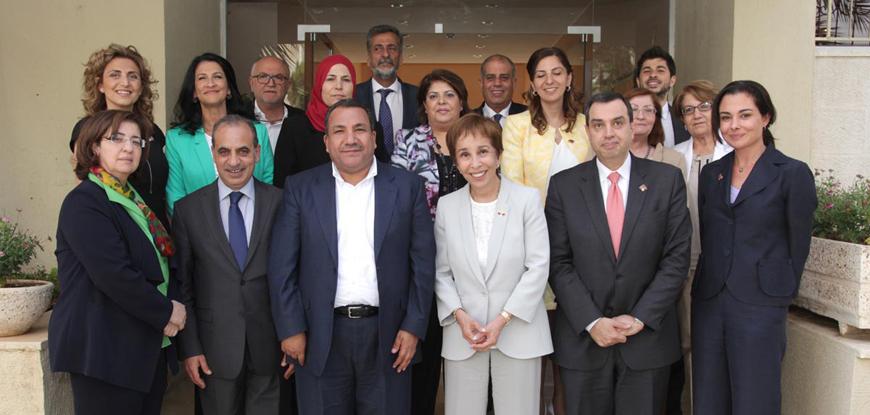You are here
Jordan to remain catalyst of change in region — Princess Basma
By JT - May 03,2015 - Last updated at May 03,2015

AMMAN — The Jordanian National Commission for Women (JNCW) is an important national institution helping the Kingdom rise to the challenges of gender equity issues, according to UN delegates.
During a meeting late last week with HRH Princess Basma, JNCW president, executive board members of UN Women, UNFPA, UNDP, UNOPS and UNICEF, who were on a field visit to Jordan, thanked the princess for her work in the areas of human development and gender equality as goodwill ambassador for UN Women.
“As early as the 1940s, Jordanian women were among the first women in the region to play an essential role in society… Jordan remains a catalyst for change in this region and we will continue to strive for reforms that will benefit women and all Jordanians,” the princess said.
The joint field visit, which brought delegates representing 24 nations and every region in the world, aimed to give the UN system a better understanding of the ways in which UN organisations can better assist Jordan in its efforts to achieve sustainable development and address numerous challenges, including the Syrian refugee crisis, according to a statement from the princess’ office.
“I have been impressed throughout my visit to Jordan by the commitment to women’s empowerment at all levels of society including at the highest level of its leadership,” said Ambassador Ib Petersen, president of the UN Women executive board and the UN’s representative for the Permanent Mission of Denmark.
Ambassador Peter Thomson for the Permanent Mission of Fiji, added that through the delegates’ “enriching” visit they have come to a consensus that the UN system needs to do everything in its power to support the significant work being done in Jordan, particularly because it is in “the eye of the storm of turmoil in the region”.
On neighbouring conflicts and the refugee crises, the princess noted that “the women’s sector is paying the heaviest price... The challenge is to ensure that Jordan’s long-term socio-economic development, especially for women and girls, is not undermined.”
JNCW Secretary General Salma Nims, who attended the meeting, underlined issues that need to be addressed to elevate the status of women, saying that “women’s economic empowerment is the core issue and key to success” for the women’s movement as a whole.
“When women are economically empowered they are better equipped to become active citizens through political participation and enabled to break away from abusive and discriminatory situations,” Nims said.
Participants at the meeting agreed that the timing of this visit is important as UN Women marks 20 years of the Beijing Declaration and world leaders are coming together at the General Assembly in September to endorse the Post-2015 Sustainable Development Goals.
“This is an opportune time for national and international stakeholders to strengthen alliances and push forward the priorities committed to by the government through international treaties and commitments,” said Minister Maria Davila, counsellor of the Permanent Mission of Colombia and UN Women executive board member.
Nims agreed, noting that as the government is currently working on the executive plan for “the Social and Economic Policy Framework Vision 2025”, “national plans and strategies can be aligned with the post-2015 development agenda to ensure we are on the right track and achieving economic development and social equity for all Jordanians.”
The JNCW, which was established in 1992, expanded its mandate in 1996 to reflect Jordan’s commitments to the Beijing Platform for Action, according to the statement.
Since then, as the national mechanism for advancing women’s issues, it has acted as a bridge between civil society and the government through consensus building and advocating for women’s issues within government work.
Related Articles
AMMAN — In the presence of HRH Princess Basma and US Ambassador to Jordan Alice G.
AMMAN — HRH Princess Basma on Saturday chaired the first meeting of the Jordanian National Commission for Women (JNCW) since its re-formatio
HRH Princess Basma on Wednesday urged the local media to raise the level of debate on the controversial Article 308 of the Penal Code that allows rapists to escape punishment if they marry their victims.

















